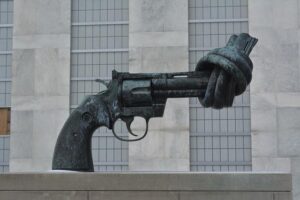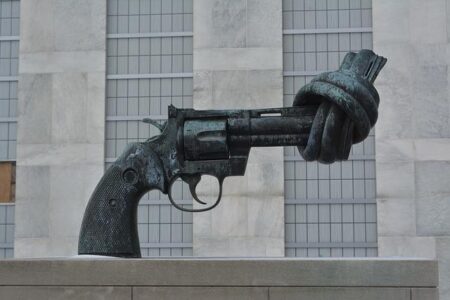Mark Dial Found Guilty of Voluntary Manslaughter in Eddie Irizarry Shooting
Former Philadelphia Police Officer Mark Dial has been convicted of voluntary manslaughter for the fatal shooting of Eddie Irizarry. This verdict, delivered by a Philadelphia court, closes a painful chapter for the Irizarry family and reignites urgent discussions about police responsibility and the use of lethal force in the city. Throughout the trial, prosecutors contended that Dial’s actions constituted excessive force, while the defense argued the shooting was a regrettable but justified response under the circumstances.
The case unfolded amid growing public demand for transparency and reform in policing practices. Key aspects scrutinized during the trial included:
- The sequence of events leading to the escalation and use of deadly force
- Conflicting eyewitness accounts challenging the officer’s initial statements
- Expert testimony analyzing whether the response was proportionate to the threat
Sentencing is anticipated in the near future, as both the community and legal system prepare for the next steps in this landmark case.
Critical Evidence and Witness Accounts That Shaped the Jury’s Decision
The jury’s verdict was heavily influenced by a combination of compelling witness testimonies and forensic evidence presented during the trial. Several eyewitnesses described the confrontation as tense but questioned the legitimacy of the perceived threat that justified the shooting. Surveillance footage played a pivotal role, revealing moments just before the shooting that contradicted the defense’s narrative. Additionally, ballistic experts and medical examiners provided detailed analyses of the gunshot wounds and trajectories, supporting the conclusion that the force used was excessive.
Key elements that contributed to the jury’s conclusion included:
- Eyewitness statements that disputed claims of immediate danger.
- Video evidence clarifying the positions and movements of both parties.
- Forensic ballistics and medical reports indicating the nature and severity of injuries consistent with voluntary manslaughter.
- Internal police communications revealing procedural shortcomings during the incident.
| Type of Evidence | Influence on Verdict |
|---|---|
| Eyewitness Testimonies | Undermined self-defense assertions |
| Surveillance Footage | Exposed inconsistencies in officer’s account |
| Ballistic and Medical Analysis | Demonstrated disproportionate use of force |
| Police Radio Transcripts | Highlighted procedural failures |
Community Response and the Broader Impact of the Verdict
The guilty verdict has elicited a complex mix of emotions across Philadelphia, ranging from relief to frustration, alongside a cautious hope for meaningful change. Many community members view this outcome as a pivotal moment in the ongoing struggle for police accountability and justice reform. Local leaders and activists have underscored the importance of this conviction as a catalyst for rebuilding trust between law enforcement and the neighborhoods they serve.
Reactions from various sectors include:
- Advocacy organizations: Celebrated the ruling as a victory for justice and called for comprehensive policy reforms.
- Residents: Shared personal experiences highlighting persistent concerns about systemic inequities in policing.
- Police representatives: Acknowledged the court’s decision while emphasizing the daily challenges officers face in the field.
| Community Group | General Sentiment | Core Message |
|---|---|---|
| Civil Rights Advocates | Supportive | Urgent call for systemic reform |
| Local Residents | Mixed | Hope tempered with ongoing concerns |
| Police Union | Measured | Respect for verdict, emphasis on officer support |
Strategies for Enhancing Police Accountability and Reform in Philadelphia
Strengthening Independent Oversight: To rebuild public confidence, Philadelphia should bolster civilian oversight by creating an empowered, autonomous review board with the authority to investigate allegations of police misconduct and recommend disciplinary measures. Implementing mandatory body-worn cameras with live monitoring capabilities and ensuring public access to incident documentation can further promote transparency.
Comprehensive Cultural and Operational Reforms: Addressing systemic issues requires a holistic approach to police training, recruitment, and community relations. Recommended initiatives include:
- Mandatory de-escalation and implicit bias training for all officers, with ongoing refresher courses.
- Integrating mental health professionals into emergency response teams to minimize violent encounters.
- Expanding community policing efforts to foster stronger partnerships between law enforcement and neighborhoods disproportionately affected by crime.
| Focus Area | Recommended Action | Anticipated Benefit |
|---|---|---|
| Oversight | Establish an independent civilian review board | Enhanced accountability and restored public trust |
| Training | Implement mandatory de-escalation and bias awareness programs | Reduction in unnecessary use-of-force incidents |
| Community Engagement | Expand and support community policing initiatives | Improved relationships and cooperation with residents |
Conclusion: Key Insights and Future Outlook
The conviction of Mark Dial for voluntary manslaughter represents a pivotal moment in the ongoing dialogue about police conduct and justice in Philadelphia. As the city moves forward, this case highlights the urgent need for systemic reforms aimed at enhancing accountability and rebuilding community trust. The verdict serves as a reminder of the broader challenges facing law enforcement and the critical importance of transparent, fair policing practices. Continued monitoring of the legal proceedings and reform efforts will be essential as Philadelphia seeks to foster a safer and more just environment for all its residents.








